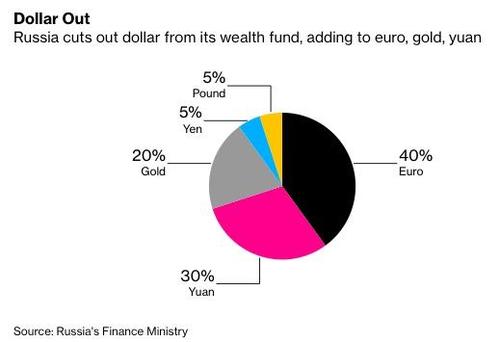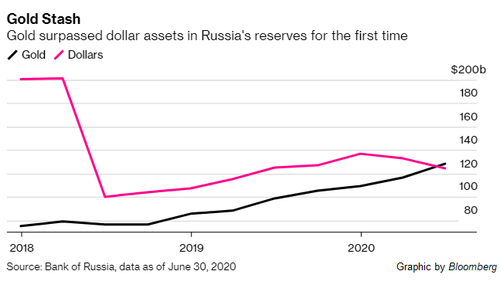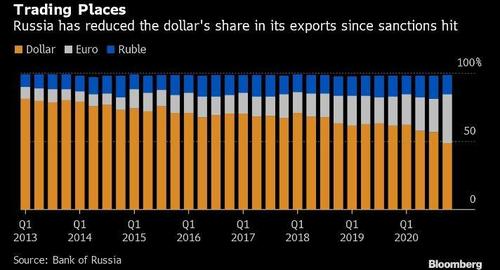Russia's $190 Billion Sovereign Wealth Fund Is Nearly Done Dumping Dollars
Just days after Russian President Vladimir Putin laid out a new national security strategy (seemingly timed to coincide with the US Independence Day Holiday to underscore the general theme) where he elaborated on how Washington uses the dollar as a tool to wage economic warfare against its geopolitical adversaries, Russia's Sovereign Wealth Fund, a nearly $190 billion pool of capital derived from the country's vast oil and mineral wealth, has taken a critical step toward dumping all its assets.
- RUSSIAN FINANCE MINISTRY SAYS IT HAS COMPLETED FX CONVERSION NEEDED TO SCRAP U.S. DOLLAR FROM THE NATIONAL WEALTH FUND
The news isn't exactly a surprise. Russian Finance Minister Anton Siluanov announced plans to dump all dollar-denominated assets from the fund's portfolio a month ago. Still, while it's unclear how much of the dumping has already been completed, the alacrity with which the massive fund is moving ahead with its plans (trading tens of billions of dollars in FX is a laborious practice and can take time) shows that this wasn't an empty threat.
News that the fund has finished this critical step toward rebalancing its portfolio also coincides with Tuesday's jump in oil prices, triggered by the latest OPEC drama.
The sovereign wealth fund's decision is consistent with the Russian Central Bank, which has dumped dollar-denominated reserves in favor of gold.
As we have explained in the past, the trend of de-dollarization is a very real threat to the dominance of the greenback, which has ruled as the world's reserve currency since the end of WWII (when it officially supplanted the British pound).
While the National Friendship Fund's decision to excise US assets from its portfolio is certainly alarming, it's only one piece of Russia's strategy to undermine the greenback. The dollar's dominance comes largely from its position as the global intermediary of choice for transnational trade. A few months ago, we reported that for the first time ever, Russia settled less than 50% of payments for its exports in currencies other than the dollar.
It's a trend that's been in place since the Obama Administration imposed sanctions over the annexation of Crimea back in 2014.
And it's perhaps the single biggest threat, because if the dollar loses its special status as an intermediary for global trade, than international central banks will have less of an incentive to hold dollar reserves, since it will reduce the demand for dollars overall.




Comentarios
Publicar un comentario